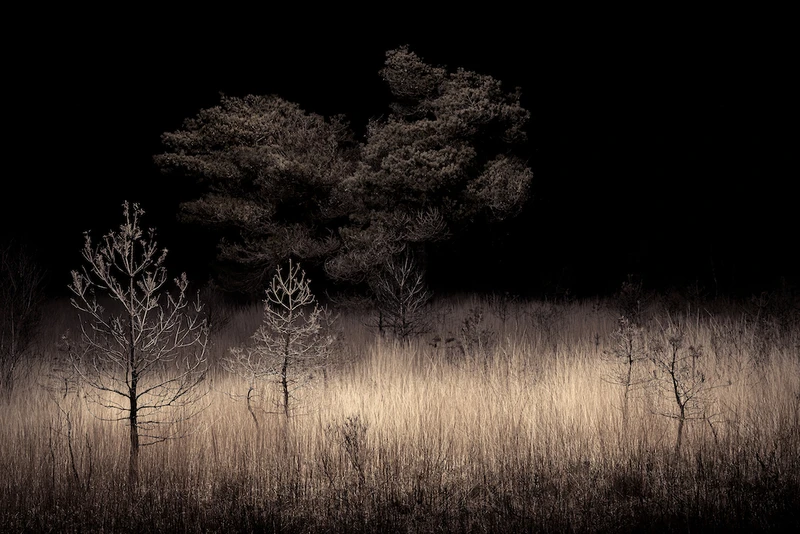Jasper Goodall: Twilight's Path
4 Jun-31 Jul 2021


"When your eyes have little information, your imagination takes over and fills in the gaps."
- Jasper Goodall
MMX Gallery is delighted to present Twilight's Path by Jasper Goodall, an exhibition of evocative nocturnal landscapes taken after nightfall in the forests, and on the moors of the British Isles.
Perhaps it is pertinent timing that MMX Gallery and Jasper Goodall have come together to present this work as we emerge from lockdown in the UK, for the dark atmospheric images convey a sense of solemnity that seems all the more poignant in light of the events that have taken place over the last year. During the Covid pandemic, green spaces took on renewed importance as the only areas still accessible to society, and many people experienced a reconnection with the natural world. And yet there is also a profound sense of loss, both of human life and of our ability to be carefree. These concurrent themes seem to resonate within Goodall's photographs of dark, arboreal landscapes which convey a sense of haunting, portentous silence. The images reference notions of the Sublime in Romanticism; an experience that can invoke 'delight' in the disquiet of being outside ones' comfort zone.
Over a three-year period, Goodall has visited areas of British forest and moorland to make images that he refers to as being 'more akin to fairytale than documentary'. There is indeed an unreal quality to the images, and this is perhaps a result of using artificial lighting; it reminds one of those spooky, unnaturally lit forests we see in the movies. In the absence of any natural illumination (save for a few that include the moon), scenes are lit as if they are in a studio setting. This results in imagery that feels eerily unfamiliar; transporting the viewer from the recognisable landscape into a kind of liminal netherworld - it's the landscape, but not as we are used to seeing it.
Goodall responds to this observation by speaking about the possibility of the darkness being seen as a metaphor for the unconscious mind; the 'light' of consciousness illuminates the known forms of tree and rock, but beyond these certainties lies the unknown.
Alongside the night-scapes is a set of images entitled 'Dark Flora'. These are still life arrangements of natural flora foraged from local woodlands. Atmospherically lit, they are reminiscent of old museum exhibits. Indeed, the curated compositions were inspired by the Victorian taxidermy dioramas in the Booth Museum of Natural History in the artist's home town of Brighton.
Each arrangement was collected from within approximately one square kilometre of land and are season-specific: May foxgloves; verdant midsummer mares tail; poisonous autumnal fungi; and dried, skeletal winter remnants. Goodall stresses the importance of using everyday flora like bramble, and other hedgerow natives, encouraging us to appreciate the natural beauty of plants so often overlooked in the everyday. They are a seasonal celebration of British wild flora.